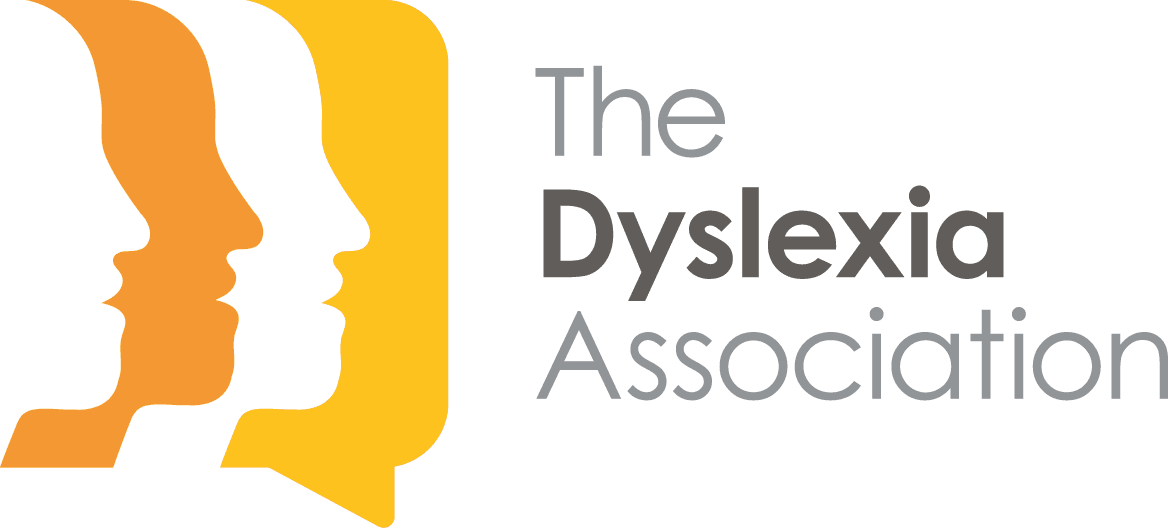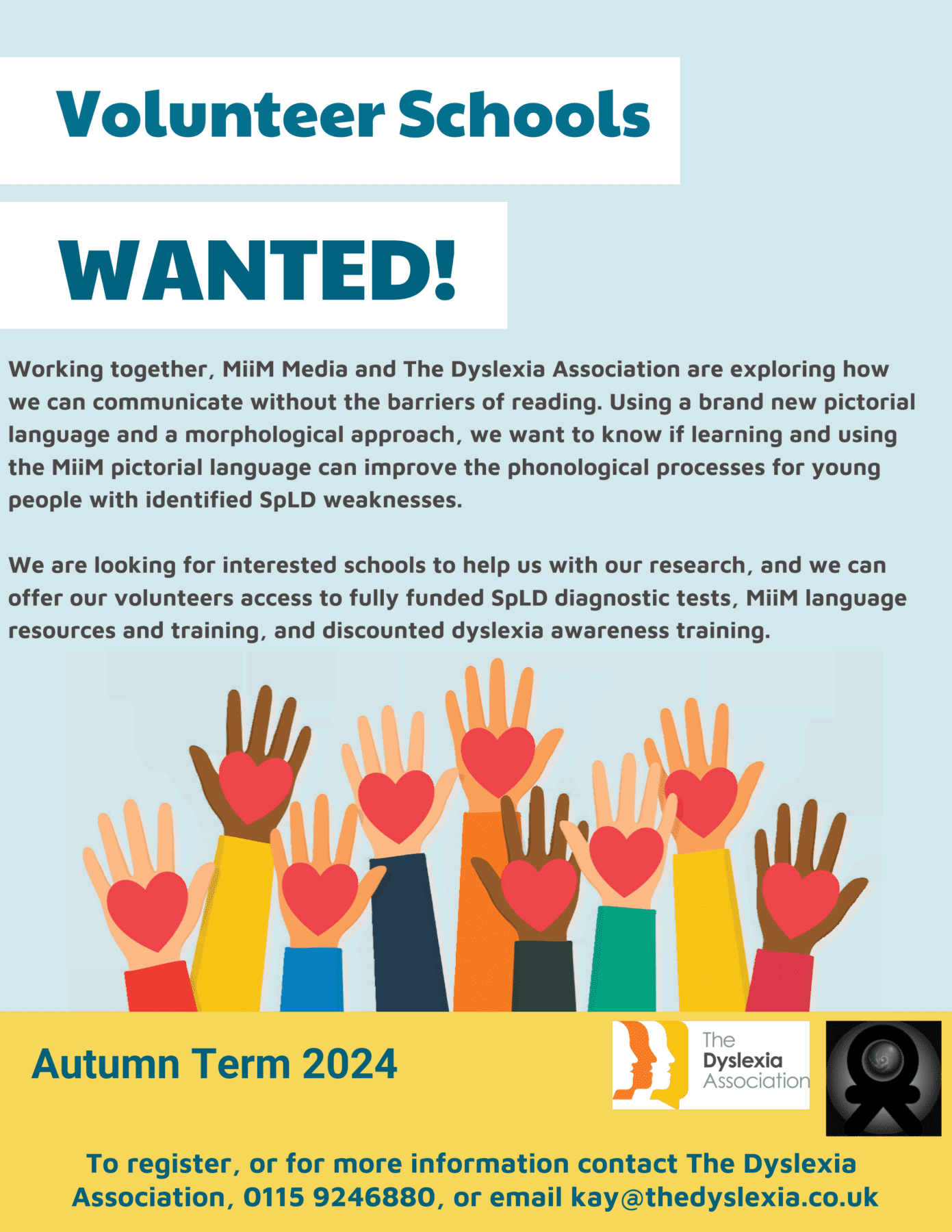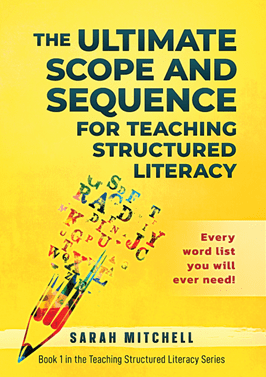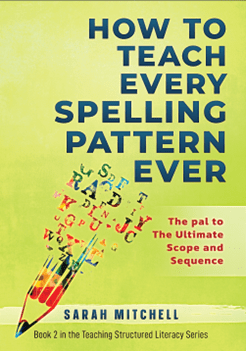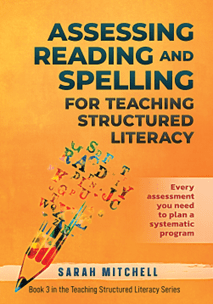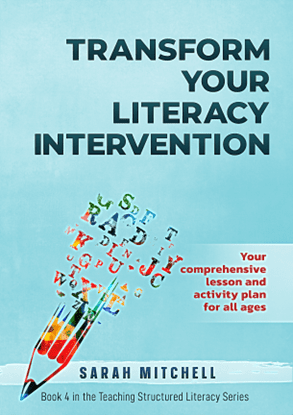Welcome to our community pages
We get a lot of emails and communications from the neurodiverse community, including clever entrepreneurs, creatives, engineers, carers and everyone else out there with brilliant ideas, new products, and just other stuff which you might be interested in. We do update these pages regularly to ensure the information is up to date, so make sure you scroll right to the end.
All published posts are checked, and The Dyslexia Association is not responsible for the content whether this be in a blog, links to other sites, or any other form of user-generated media. All posts, and other information require authors to identify themselves.
Please see our website and external links disclaimer for further information
If you would like something published on these pages, send this in to helpline@thedyslexia.co.uk, with the title: Community Pages
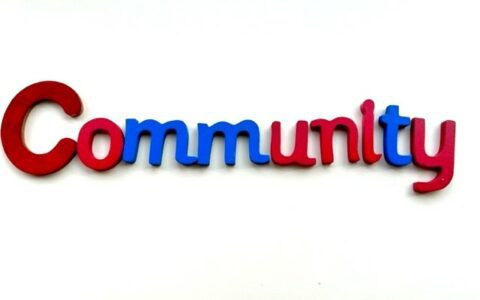
Dyslexia Dysfunction by Ashley Walker
Episodes will be released every month
Nominated for a ‘British Dyslexia Association Award’ and Winner of the ‘Best Education Supplier Award’ – Spike’s Sight Words educational board games are now being used in schools and libraries across the UK as a fun, engaging way of helping children practise their reading and spelling.
We are fully backing the Department of Education’s ‘National Year of Reading 2026’ campaign and hope that with the help of our educational board games, we can get more children into reading again. We are also delighted to learn of the ‘Big Ambition for All’ program where teachers will receive more support in helping children, especially those with SEND. You can read more about this here
How can Spike’s Sight Words help with children’s reading?
- Game based learning
- Multi-sensory learning
- Increases reading fluency
- Increases reading confidence
- Adaptable to various levels
- Caters to diverse learners such as those with dyslexia
- Screen-free learning
What themed packs do we offer?
What else do we offer?
- SPIKE’S SCHOOL PACKAGES – fully booked from September – October 2025
- SPIKE’S ARTICLES – get top tips about dyslexia, SEN and reading in general
- DONATE A PACK – donate a pack to a school in Africa
- WHO INVENTED SPIKE’S SIGHT WORDS? Read our story
- OUR AWARDS AND NOMINATIONS – we have been nominated for 2 categories in the Education Today Awards. Please VOTE for us by clicking here
What do educators say about our board games?
| Spike’s Educator Reviews – Spike’s Sight Words
Obviously, we feel our educational board games are great but what do EDUCATORS think of them? spikessightwords.com |

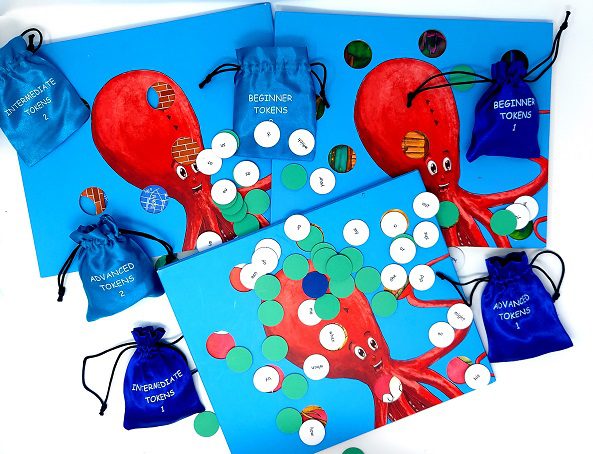
|
Welcome to our FREE ANND webinar!
Welcome to our FREE ANND webinar!
ANND are a non-profit coalition of dedicated organisations who are passionate about supporting our community. ANND is the Adult Network: Neurodiversity and Dyslexia and we are comprised of Succeed with Dyslexia, Adult Dyslexia Centre, Yorkshire Rose Dyslexia Association, Hampshire Dyslexia Association, neurobox, Helen Arkell Dyslexia Charity and The Dyslexia Association.
We would like to invite you to our free, ANND webinar, we will be exploring : Using my Voice as a Catalyst for Change with Advocate and Author Rachel Clark. Rachel is an 18 year old neurodivergent advocate, author and founder of her coaching business, ChampionAudhd. Rachel works with the NHS, and charities such as Mind and Autistica, sharing her story and experience of growing up as an Autistic ADHDer and dyslexic in a neurotypically designed world. Her debut book is called “How to Save Your Own Life: A guide to recovering from an eating disorder as an autistic person” which is publishing next year.
Join us therefore for an informative and inspiring session!
When? The session will be broadcast live on Teams on Wednesday 10th December 2025, 7pm – 8pm (GMT)
How can I Join? Here is the link to join us on Teams: Join the meeting now
**Please be advised we will record the session for those who can’t make our broadcast live, so by joining us on the evening you are agreeing to the recording. (Please do keep your camera switched off and remain on mute, unless you wish to ask a question at the end)
Our sessions explore Dyslexia and Neurodiversity for Adults and their Families.
The ANND hosts are: Donna Stevenson (Head of Training Services, neurobox), Sue Flohr MBE (Manager of Adult Dyslexia Centre), and Pat Payne (Chair of Yorkshire Rose Dyslexia Association), and Kay Carter (CEO, The Dyslexia Association).
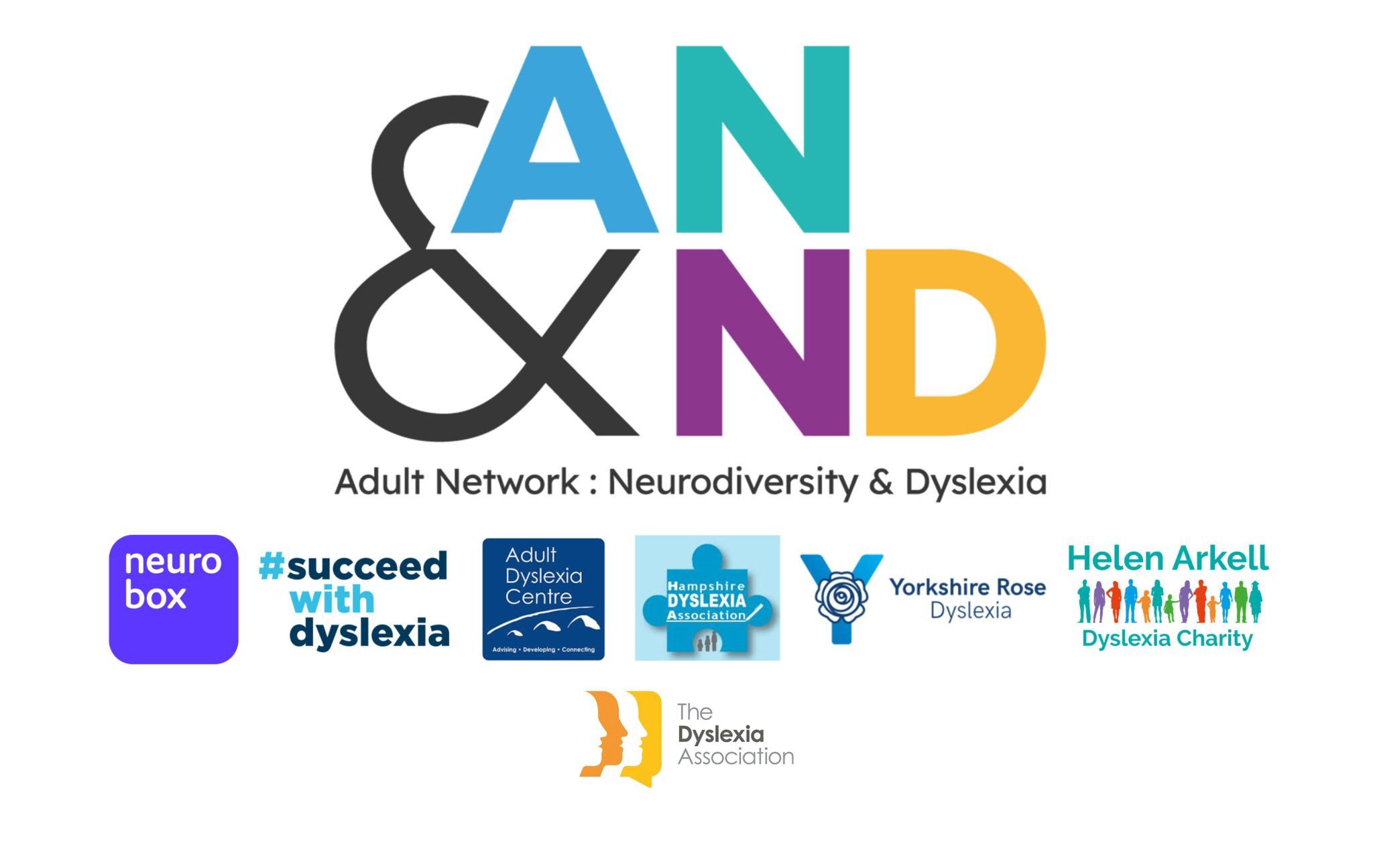
Found out more from Emma
To celebrate Dyslexia month in 2024 we brought you an exclusive short film made by Todd Griffin and Jacob Priddle (with support from The Dyslexia Association) to contribute to the theme of the awareness week of ‘whats your story’.
Find out more about Adunola Shoge’s journey from lived experience of growing up with severe dyslexia and eventually emerging the Best Graduating Student of a top-ranked university in Africa – the first-of-its-kind academic achievement for a dyslexic learner.
You can get a quick sense of her message by reading the short preview of her book THE DYSLEXIC GENIUS (BOOK PROJECT OVERVIEW)
If you would like more information contact thedyslexicgeniusbook1@gmail.com
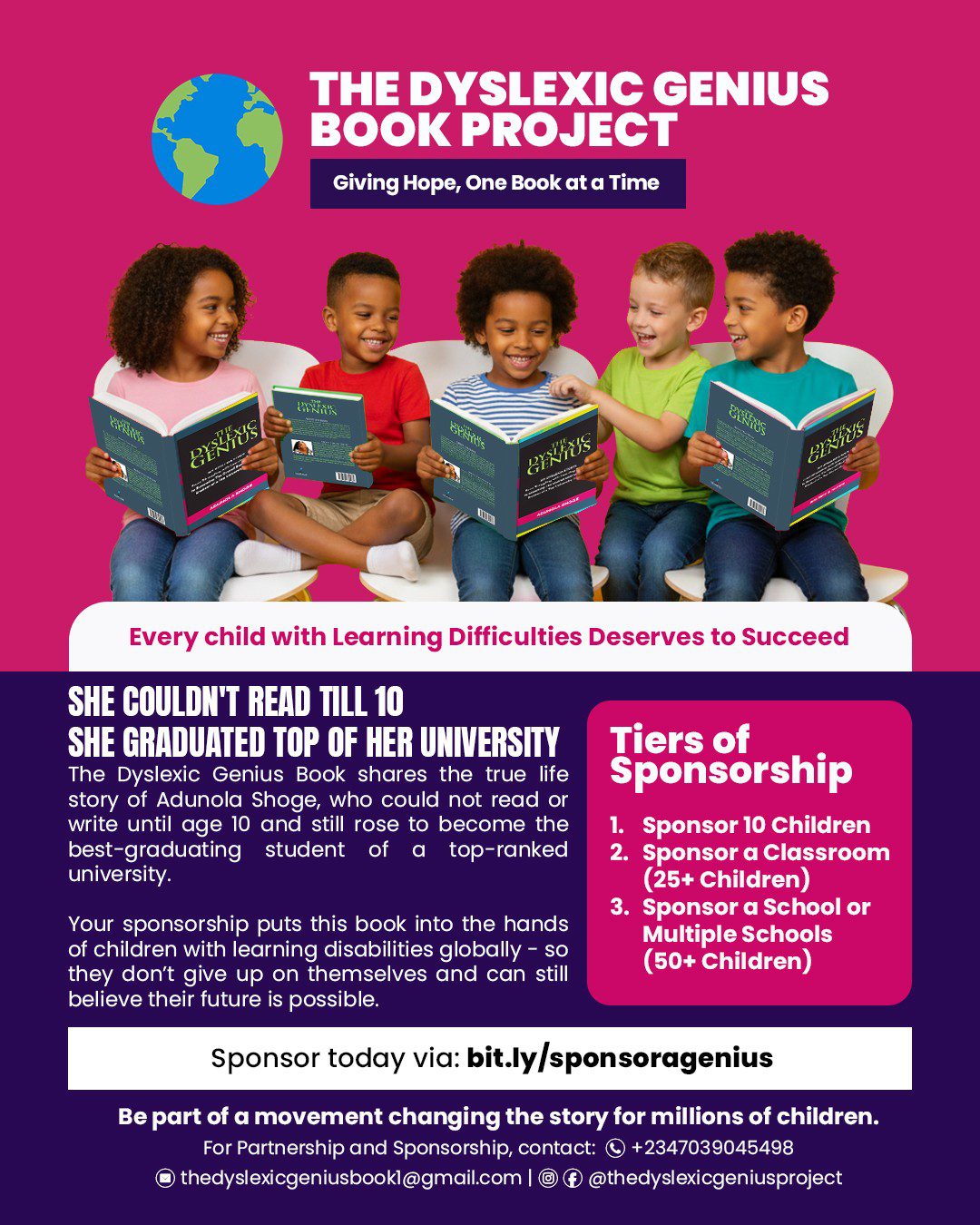
🧠📘 Research participants wanted (UK, 18+)
Recruiting participants as part of thesis research for the Doctorate program of Clinical Psychology at the University of Exeter.
The study involves a 4-week digital mindfulness programme, followed by a short interview. All information is confidential.
You may be eligible if you:
• Are aged 18 or over
• Were diagnosed with dyslexia after age 18 or self-identify as dyslexic
• Have access to a smartphone to download a free mindfulness app
• Speak English fluently and live in the UK
Your involvement will help shape dyslexia research and the support offered to adults living with dyslexia. We are starting recruitment in January 2026.MRP Recruitment Poster
💫 Please contact the lead researcher, Imogen Swann, on is513@exeter.ac.uk to register your interest”
An important piece of research underway in our community. Previous studies have shown that while only around 1 percent of corporate managers identify as dyslexic, nearly 35 percent of entrepreneurs do (Logan, 2009). It is a striking contrast and one that suggests dyslexic thinking may play a far greater role in innovation and leadership than we have formally recognised.
Stan Gloss, a doctoral researcher and long-time entrepreneur, is leading a new study to better understand how dyslexic founders develop and apply their innovation and delivery strengths. It is a chance to bring real data to a conversation that has for too long relied on anecdote.
If you are dyslexic and have founded a commercial or non-profit organisation of any size, including solo practices, I would strongly encourage you to take part. The study takes around 30 minutes and includes a complimentary Innovator’s DNA report highlighting your own innovation and execution strengths.
This research has the potential to help all of us build more inclusive, creative, and future-ready organisations, and to better support dyslexic talent across the workforce.
👉 Learn more and participate here: www.dyslexicexecutivenetwork.org
This commentary has been provided by Alex Pagett from Sunbeam Education
Thinking Differently: Potential Strengths of Dyslexia at School
Discussions about dyslexia regularly focus on the challenges it presents, particularly reading, writing, and spelling. There’s no doubt that these are significant and require support. However, focusing only on the challenges misses an important part of the picture. Research suggests that the different way the brain is wired in dyslexia might also lead to some valuable strengths. Understanding these is important when thinking about learning with dyslexia.
A very interesting research summary (Not All Those Who Wander are Lost: Examining the Character Strengths of Dyslexia) has been written on this, and we will include all the research papers used in this article.
Even though we are talking about the strengths that come with dyslexia, it’s important not to generalise. Not every person with dyslexia will have these strengths, and research is ongoing.
- Visual-Spatial Reasoning and 3D Thinking
Some people with dyslexia show improved abilities in understanding and mentally maneuvering shapes. They might be good at visualising objects from different angles or understanding how things fit together.
In School: This could look like talent in geometry, technical drawing, design technology (DT), model building, or understanding diagrams and maps. They might grasp physical concepts in science more readily than others.
The Evidence: Some studies show dyslexic individuals outperform non-dyslexic peers on tasks like reconstructing 3D objects from memory or identifying impossible figures. Research used neuroimaging to show more efficient brain usage patterns for certain visual-spatial tasks. Find more information at Dyslexia and Visuospatial Processing Strengths.
- “Big-Picture” Thinking
Thinking outside the box and building novel ideas are regularly linked with dyslexia. This involves making unusual connections between concepts or working with a ‘big picture’ rather than getting in on the details.
In School: Students might offer new ideas or excel in creative subjects like art or drama, independent of how hard they find writing. They might understand the lesson quickly, especially if explained visually or orally, or enjoy strategic thinking.
The Evidence: There seems to be strengths in divergent thinking (finding unique solutions) and whole idea processing. Some researchers propose that this relates to ‘exploratory’ cognitive styles. See resources like Seeing Dyslexia as a Unique Cognitive Strength and Embracing Dyslexia: My journey and the strengths it brings.
- Narrative Reasoning and Episodic Memory
Some evidence suggests people with dyslexia can be strong at thinking and remembering information in the form of stories or personal experiences (episodic memory), rather than just abstract facts. This can even feel uncanny as they remember some things with incredible detail.
In School: This might mean that students with dyslexia have excellent recall for events, field trips, or audio stories. They might learn history well when presented as a narrative. This type of memory can be used as a learning strategy.
The Evidence: Some researchers and groups like Dyslexic Advantage highlight this ability to think and remember in terms of experiences or mental scenes. Some reports suggest this type of memory helps connect ideas and build understanding of the bigger picture (University of Michigan’s Dyslexia Help). However, research is complex, and other studies mention that there are challenges with certain memory tasks. Many people with dyslexia rely more on this type of learning even if other types of memory recall are harder.
- Empathy
Anecdotal reports and some research suggest individuals with dyslexia can possess strong interpersonal skills and empathy. Those who are navigating their own challenges can form greater sensitivity towards others.
In School: They might be good team players in group projects, act as mediators, or show extra kindness and fairness towards classmates. They may possess strong emotional intelligence.
The Evidence: Enhanced empathy and skills in “reading” people and social situations are often reported.
Conclusion
It’s important to remember, that although there are real challenges to dyslexia, the brain works around these and often excels at other things. A more balanced picture helps with self-confidence. Try learning with these strengths, like project-based learning or storytelling, alongside specific, extra support for school challenges, can make a positive difference.
Focusing only on what’s not working can be upsetting. By acknowledging and building on the potential strengths associated with neurodivergence can help students with dyslexia build confidence and lead to success.
Alex Pagett PhD. is an expert in productivity and coaching students with SEN and has a PhD in Chemistry from the University of Edinburgh. He founded Sunbeam Education, an expert tutoring and coaching company to support students and families with SEN across the UK. Alex had been diagnosed with ADHD and has family with autism.
Have a look at this new book to transform bedtime reading for dyslexic storytellers
Silent Snow is a new book that gives dyslexic parents and storytellers the opportunity to create their stories and turn bedtime reading into a joyful experience.
The book, which is published by Marcia M Publishing, is full of wonderfully detailed and enchanting illustrations from top to bottom guiding allowing neurodivergent storytellers to personalise each story and embark on an adventure with every turn of the page.
Silent Snow’s uniqueness lies in the fact that there are no words on its story pages, unlike like most children’s books, which provides a springboard for imagination.
The brainchild of author Kirsty Heap, a dyslexic storyteller, Silent Snow was borne out of the challenges she faced reading stories to her own children when young. Fuelled by this personal struggle and powered by her imagination Kirsty drew on her dyslexic strengths to find a creative solution when it came to bedroom reading.
On a mission to make bedtime magical for everyone, Kirsty invites readers to join the adventure and let their imaginations run wild, spark their and their little reader’s creativity, and embrace the magic of bedtime tales that knows no boundaries.
Kirsty said: “As I gazed at the cover when I first got the book, memories flooded back to the countless nights spent crafting stories for my children when they were young.
“This book has been born from those special moments, from the magic of imagination that I cherished sharing with them. The illustrations are exactly how I envisioned them and I have pictured storytellers sharing these tales with their little ones, and young children’s eyes lighting up with excitement.”
With Christmas nearing, with Silent Snow due for publication on 1 December, it is destined to be a great stocking filler! Use this link to get your copy https://amzn.eu/d/fB66jpw (Price: £7.99)
Why not create your own snowy adventure and see where your story will take you?
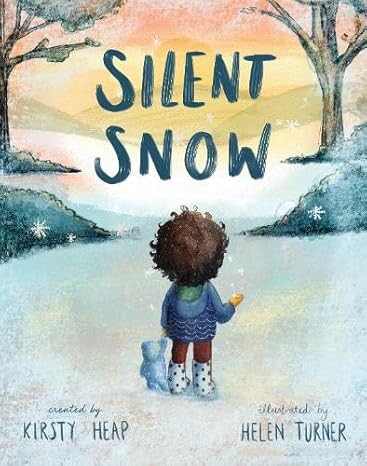
Created by Leyton O’Day as a passion project to support his partner during her university studies, where she faced the challenge of not having access to assistive software tailored for her dyslexia, Clipboard TTS serves as an invaluable tool empowering you to read, listen, and translate like never before.
Features:
Text-to-speech: Detects when you copy a text or image, and instantly reads it aloud! No more copy-paste!. With support for 49 languages and 100+ voices, you can listen to your text in the language and voice of your choice.
Image-to-text: When you copy an image, Clipboard TTS will automatically detect any text within the image, and convert it to speech.
Highlighting: The current sentence and word being read aloud are visually emphasized with a colour of your choice, making it easy to follow along with the text. This feature is especially helpful for individuals with reading difficulties or those who need additional visual cues while reading.
Overlays: Improves the readability of the text by changing the background colour of the output box. This feature is especially useful for individuals with dyslexia who have difficulty reading text on a white background.
Font Customization: Customizing font type (with support for the OpenDyslexic font!), letter spacing, and size enhances readability and allows readers to personalize the text to their preferences. Previewing the changes provides a helpful representation, enabling users to fine-tune settings for optimal readability.
BoldCue: The first half of each word is made bold, providing clear visual cues that help your eyes quickly jump from one word to the next. This makes it possible to read quicker and with greater comprehension.
Auto Translation: Automatically detects the language of the copied text and translates it to the language of your selected voice. Anything you copy will be instantly translated!
AI Assist: An experimental feature that utilizes artificial intelligence to mutate the copied text based on a custom prompt of your design. e.g., you copy an article paragraph, the AI Assist summarises the paragraph, and the summarised version is read aloud instantly!
Substitutions: Customize the text before it’s read aloud. You can use substitutions to replace certain words or characters with others, such as changing “e.g.” to “for example” or removing a dot to prevent a pause in the audio.
Custom Mutations Order: Many features mutate the output text, such as Auto-Translation, Substitutions, Auto-Dictionary, and AI Assist. When multiple features are active simultaneously, you have the flexibility to tailor the sequence in which they modify the copied text with our “Custom Mutations Order” feature.
See more features here: https://www.clipboardtts.com/product/features
Claim Your Free Trial!
Sign up here: https://www.clipboardtts.com/auth/sign-up
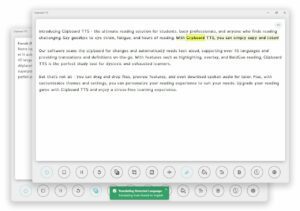
This is Andy Salmon from Sir Linkalot and his new exciting app
Sir Linkalot is an award-winning app for spelling tricky words from ‘was’ to ‘onomatopoeia’ that many dyslexia associations have called groundbreaking.
To find out what it’s all about, take a peek at this clip that contains a ‘celeb warning’ at the end Sir Linkaot – Taster video
The annual subscription from any app store is £50 but there is a 40% discount for members of dyslexia associations.
If you’d like to the most of this offer, send an email to sirlinkalot@sirlinkalot.org, putting in the subject line ‘TDA discount’.
You will be emailed a code that will give the whole household access on any device including laptops and PCs.
It has never been done before to this extent and that’s why it’s getting so much attention.
Your use of mnemonics (links) in this way is a brilliant idea – Ruth Miskin CBE, government advisor and creator of The UK’s leading phonics programme ‘Read Write Inc’
Congratulations on tackling something that no one has managed to tackle. It’s incredible – Susie Dent, Countdown’s resident lexicographer
An utterly brilliant system for creating a world of wonderful happy spellers – Stephen Fry
This is fantastic. I can now spell diarrhoea! – Sir Paul McCartney
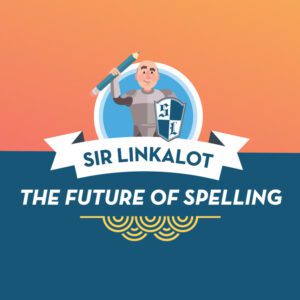
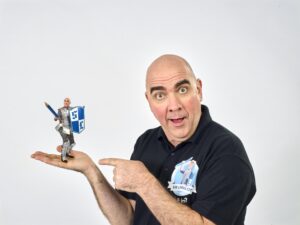
Edward Spencer from Highlightly
🌟 Discover a New Way to Read with Highlightly: Empowering Neurodivergent Readers! 🌟
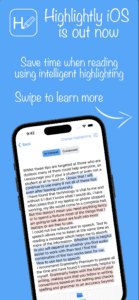
At Highlightly, we believe that reading should be an empowering experience, especially for those who navigate the world through a neurodivergent lens. Our revolutionary approach transforms the reading journey, providing a supportive platform that understands and caters to diverse needs.
📚 The Power of Contextual Highlighting
Unlike traditional methods of rewording or summarizing text, Highlightly brings a fresh perspective to reading. We believe in the strength of context, and our innovative solution highlights key sentences within their contextual framework. This not only eliminates unnecessary details but also empowers you to focus on what truly matters, fostering efficient and effective reading.
👩🎓 Supporting Skim Reading for Students
Skim reading is a vital skill, especially for students navigating through extensive study materials. We recognise the importance of this skill and have designed Highlightly to support this by keeping the surrounding text of highlights available. So you can say goodbye to wading through layers of information; instead, embrace the ability to quickly identify and absorb essential content.
📑 Smart Highlighting Modes for Every Scenario
Highlightly isn’t just a one size fits all summary generator; it’s a versatile reading companion. With multiple smart highlighting modes catering to different scenarios, helping you find the information you need quickly.
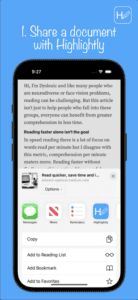
🚀 Born Out of Necessity: A Personal Journey
Highlightly was born out of a personal necessity. As someone who is dyslexic, I couldn’t get through all my university readings. While screen readers offered assistance, they couldn’t be the complete solution. Before Highlightly, the arduous task of listening to entire books became the norm, taking up precious time. Highlightly changes the game by allowing users to skim read just the important new ideas in a document efficiently, saving time and energy.
🌐 Available Anytime, Anywhere: Web and iOS Compatibility
Highlightly is available both on the web and iOS so you can work dome home or on the go on phone or iPad.
🙌 Join the Highlightly Community and 🌈 Experience the Joy of Reading with Highlightly
We are dedicated to enhancing the reading experience for neurodivergent individuals and we hope you find Highlightly as transformative as we do.
We hope that you give Highlightly a go. We are committed to constantly improving the app. If you have ideas, thoughts, or feedback, we would love to hear from you. Your inputs will help us shape the future of Highlightly and reading for everyone in our wonderful community.
🚀 Download Highlightly Today and Revolutionize Your Reading Experience! 🚀
Sarah Mitchell has been in touch with a solution for the frustration of finding the right resources
As a specialist literacy teacher, I’m sure I’m not alone in feeling frustrated and overwhelmed by the lack of resources available especially for older students. I know I certainly felt that way when I completed my Level 5 certificate. Where were the resources that made it easy to explicitly teach phonics, morphology, grammar, and writing skills? The ones I found were often lengthy, outdated, and left too much of the planning to the reader.
I recall feeling like I was stuck in a rut, searching for resources that would provide the structure and guidance I needed to support my students’ learning. But what I found was either too vague or too rigid, leaving me with more questions than answers.
As I began to create my own resources, I knew that I had to make them different. I wanted to create something that would be easy to use, evidence-based, and accessible to all specialist teachers. Something that would provide the clarity and guidance we needed to teach literacy with confidence.
After years of working with students with Specific Learning Difficulties (SpLD), I knew that what they needed was a systematic and sequential approach to learning. An approach that would identify and address their gaps in knowledge, rather than trying to follow a rigid program from start to finish.
**The Teaching Structured Literacy Series**
The result is the Teaching Structured Literacy Series, a set of four books designed to support specialist teachers like you. Each book is carefully crafted to provide clear structure, guidance, and activities that can be tailored to your students’ specific needs.
| The first book, “The Ultimate Scope and Sequence for Teaching Structured Literacy,” provides a comprehensive framework for teaching literacy, including phonics, morphology, etymology and accurate spelling rules.
**Feedback from Claire Harvey, Head of Education at the Helen Arkell Dyslexia Centre: “A cumulative, sequential, step-by-step approach to teaching literacy underpins all specialist tuition. Checklists to track progress, and word examples for each task. I wish I had this book when I was training!” |
| The second book, “How to Teach Every Spelling Pattern Ever,” delves into the why behind spelling patterns and words, providing explanations.
Claire says: “Includes not only the WHAT to teach but also the HOW to teach spelling, including explanations for WHY words are spelt as they are. Drawing on morphology, etymology, and phonology, this book delivers a story behind even some of the trickiest letter patterns and words to teach, making them ultimately more accessible, meaningful, and memorable for both the specialist teacher and the learner. This is a super resource for any specialist teacher to have in their toolbox!” |
| The third book, “Assessing Reading and Spelling: For Teaching Structured Literacy,” offers checklists and assessments to help identify specific areas of difficulty and track progress.
Claire says: “Supports specialist teachers to assess, plan and then deliver personalised literacy targets based on their learner’s specific areas of weakness and gaps.” |
| And finally, “Transform Your Literacy Intervention” provides practical advice on how to structure lessons with SpLD learners, along with valuable resources and reinforcement activities.
Claire says: “For any specialist teacher looking for support on how to structure their lessons with SpLD learners, this book delivers. It includes a lesson template alongside valuable advice on how to deliver lessons to ensure targets and teaching goals are achieved. There are some super examples of teaching resources and plenty of reinforcement activities and games to ensure learners can practice and embed new skills. Thank you, Sarah, for another super book in your range.” |
**What You’ve Been Waiting For**
I’ve been thrilled to hear from hundreds of specialist teachers who have used my resources and have seen real improvements in their students’ learning. The feedback has been overwhelmingly positive, with many teachers praising the clarity and simplicity of the resources.
As someone who has been in your shoes, I understand the frustration and uncertainty that comes with trying to find the right resources. But I’m confident that my series can help you overcome these challenges and provide the support you need to teach literacy with confidence.
So why not take a look at the Teaching Structured Literacy Series today? With these resources at your fingertips, you’ll be well on your way to transforming your literacy teaching practice and making a real difference in the lives of your students.
Available at the Helen Arkell Dyslexia Centre online bookshop. A portion of the sale goes to the charity.
The Ultimate Scope and Sequence:
https://helenarkell.org.uk/product/ultimate-scope-and-sequence-for-teaching-structured-literacy/
How To Teach Every Spelling Pattern Ever:
https://helenarkell.org.uk/product/how-to-teach-every-spelling-pattern-ever/
Assessing reading and spelling:
https://helenarkell.org.uk/product/assessing-reading-and-spelling-sarah-mitchell/
Transform Your Literacy Intervention:
https://helenarkell.org.uk/product/transform-your-literacy-intervention/
www.helenarkell.org.uk
Join Tina, a mum of a dyslexic child and her blog, a must read for parents who have just discovered their child has a learning difference.
Disability ? / ability?
Dis / Dys it’s a prefix which denotes lack
Life is full of coincidences and probability and hidden patterns
A 5 and an S look similar if badly transcribed. The source of the error can hard to see is it the transcription or something inside me.
A constant struggle to hide in a world of ableism
The able do not see the ism , cause there preconceived idea is that everyone is like them.
QED
ableism is hidden just as my disability is hidden it does nt show on the surface
I am not neurotypical nor are the people I work with our expressions are different
like those born into a foreign culture we see the world differently
This happened in the womb during our formation at a genetic level our brains processed differently
faster in some regards slower in others
Just different not better or worse
the pathways create new Neuro connections
give us new and different expression
I am on this spectrum of existence grouped with us neurodiverse bunch of whom I am proud to be associated with some of us are non verbal
But what I have learned from my none verb kin is expression does nt have to be limited to language it expressed emotionally , creativity in many tender and human ways
It’s exciting to look at the world though new eyes
Art and the art of living can nt be contained by such limited definitions as able / disable cause where others see lack I see humanity reaching exploring finding new ways of being
In community
In nature
With use of technology
All in creative and diverse ways
Expressing are total selves in totally unique ways
Finding away in a maze not of our making
Making a life
Expressing our spirit
With our wired different brains
I hated my label at school
Labelled thick
But now I embrace it
Viva la difference
Because those who think differently
Add new ways of seeing to the wonderful world in which we live
Check out some more of Rob’s writing using these links:
https://cs.astronomy.com/asy/b/astronomy/archive/2008/12/08/relativity-rap.aspx
https://www.abctales.com/story/valiswaverider/shorthand-conversations
https://www.abctales.com/story/valiswaverider/shoreline-autumn
And, a short story:
Kid.
That you Jack ?
It took me six weeks to gain my sea legs now I was finding it an usual sensation to be back on dry land.
The docks in Liverpool were dull grey and feature less in fact no less feature less than the arctic circle in the middle of winter. I had never known cold like we experienced on those winter coveys.
I held a cigarette to my lips to fight off the cold of a bitter wind at the quayside. The dock was a hive of activity we were loading up for the next voyage but it was long slow work and at present there was no real sense of urgency.
Another ship was docked much further down the side of the quay. They were offloading prisoners off war in handcuffs.
Albert who I was working with started shouting at one of them “ well bugger me , Jack , Jack is that you ?” The prisoner looked over at Albert and smiled a smile of pure joy. “Albert” he responded.
“What the hell are you doing in a Jerry uniform”. The guards did nt seem to mind the two of them chatting. “Well it’s a funny story really I was visiting my uncle in the Black Forest, when the next thing you know war had been declared and they have conscription over their well I could nt very well say no or they d have had me shot , so the next thing you know I am in the German navy”.
I did nt let on I was English or they d have hung me as a spy but all those summers in the black Forrest helping on the farm with Uncle Ernst meant I was a fluent in German , anyway it’s been a nightmare and the ship getting torpedoed was really a blessing in disguise, can you do me a big favour and let the wife know I am still alive may be just keep quiet about the been in German navy part.
Thanks R Wheeldon
Alex has written a book about a detective cat who gets their letters mixed up, see below for more information….
Hello
I have written a children’s book (ages 8 – 12) about a cat who is a detective. In order for him to communicate with the pet’s owner he fashions a note from scratching out letters from magazines only he gets the letters b, d, p and q mixed up.
